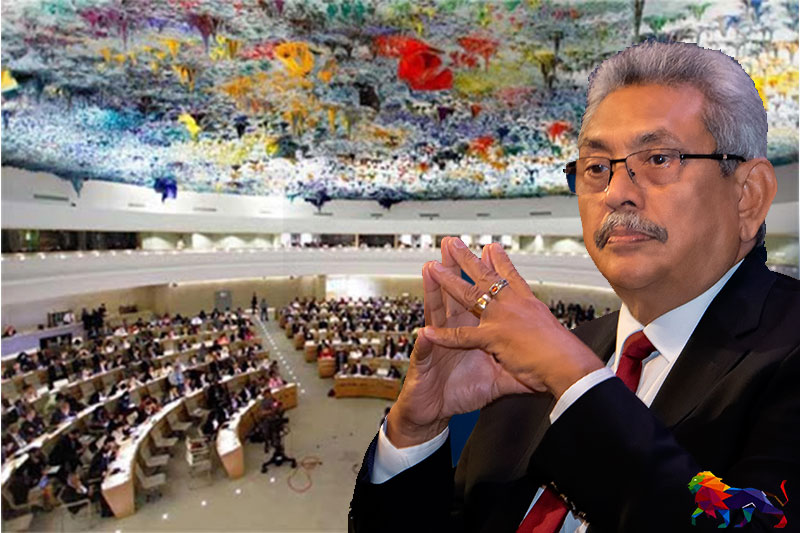The Ministry of Foreign Affairs last week presented a briefing note to foreign missions in Sri Lanka on the progress made by the Government on human rights-related issues in connection with the 48th Session of the United Nations Human Rights Council (UNHRC) scheduled to commence next week, The Sunday Morning learnt.
UN High Commissioner for Human Rights Michelle Bachelet is to make an oral presentation on the human rights front on Sri Lanka on the opening day of the sessions.
During the last session at the UNHRC in March 2021, Resolution 46/1 was adopted to enhance the capacity of the Office of the High Commissioner for Human Rights (OHCHR) when monitoring and reporting the human rights situation in Sri Lanka, including the progress on reconciliation and accountability.
The 14-page briefing note by the Foreign Ministry, dated 31 August 2021 and seen by The Sunday Morning, is to be distributed among the missions of members of the Core Group on Sri Lanka.
The Core Group on Sri Lanka consists of the UK, Canada, Germany, Malawi, Montenegro, and North Macedonia.
The note included details on the work carried out thus far by the Office on Missing Persons (OMP), the Office of Reparations (OR), and the Office for National Unity and Reconciliation (ONUR), progress on the Sustainable Development Goals (SDGs), work by the Human Rights Commission (HRC), the Presidential Commission of Inquiry (PCoI) to investigate and inquire into the findings and recommendations of preceding commissions and committees appointed to inquire into serious human rights violations in the country, and revisiting the Prevention of Terrorism Act (PTA).
In the run-up to the UNHCR session, the Government sought to reassure foreign diplomats on Sri Lanka’s keenness to co-operate with the international community to address issues in a positive manner.
This message was also communicated to foreign missions during recent meetings between envoys and Foreign Minister Prof. G.L. Peiris in Colombo, The Sunday Morning learnt.
The Foreign Ministry also apprised the diplomatic community on the pardoning of ex-Liberation Tigers of Tamil Eelam (LTTE) cadres, resettlement of internally displaced persons (IDPs), release of lands, engagement with civil society as well as international human rights and other treaty obligations, and engagement with UN Special Procedures Mandate Holders.
Addressing a media briefing last Thursday (2), held at the Department of Government Information, the Foreign Minister stated that Sri Lanka is navigating through a difficult phase.
“The Government of Sri Lanka today is performing under difficult and challenging circumstances with the rapid spread of the Covid-19 pandemic. In this situation, Sri Lanka has a very convincing story to tell the international bodies that will be meeting within the next few weeks. The UNHRC met last in March 2021 and since then, we made tremendous progress on different sectors,” Prof. Peiris stated.
He explained that President Gotabaya Rajapaksa had appointed a Commission of Inquiry (CoI), presided over by a sitting judge of the Supreme Court, to inquire about human rights violations in the country.
Commenting on the operation of the CoI, the Foreign Minister stated: “It (the CoI) has submitted to the President an interim report on 21 July, and that will encapsulate measurable progress that has been made in many of the matters that are dealt in the resolutions pertaining to Sri Lanka.”
Prof. Peiris also stressed that the independent institutions, such as the OMP, the OR, and others, have made progress.
“We have left behind the war. It was a painful period of three decades for all of us and now we have found our way out of the woods,” the Foreign Minister opined.
He further said that the President has taken a decision under Section 13 of the PTA to appoint an Advisory Board, presided over by previous Chief Justice Asoka de Silva to identify others who can be released into the community after adequate rehabilitation without any detriment to vital interest relating to national security.
“These are some of the accomplishments which we will present to international bodies that will be meeting within the next few weeks. I would also like to highlight that all these things are being achieved in a vibrant democratic quality. I would like to invite anyone to come and look at the parliament sessions; the Opposition is certainly very active in the Parliament and questions are being asked during both oral question sessions and at adjournment debates. Thus, it is a very vibrant democratic culture,” he opined.
Prof. Peiris denied the allegation of the shrinking of democratic space in Sri Lanka, stating that the Government is not taking any measures to impose restrictions on the freedom of the media. “Criticism is healthy, and we accept it,” he said.
“The courts have not hesitated to intervene to tell the Police that they have no right to stop the freedom of expression and that people have a right to do this. The action by the Police has been struck down with inhibition by the courts of the country. It is a practice of democracy,” the Foreign Minister added, emphasising that the Government does not interfere with the independence of the Judiciary.
However, Tamil National Alliance (TNA) MP M.A. Sumanthiran PC told The Sunday Morning that the Government had not made any progress at all, pertaining to resolving the matters mentioned in the resolution.
“In the resolution, it calls for action on a number of issues, and the Government can only say that they are continuing the Office of Missing Persons, Reparations Office, etc. During the International Day (of the Victims) of (Enforced) Disappearances, the OMP merely had a meeting and talked about giving compensation and not finding the guilt of anybody (sic), which is clearly opposite to what that office had to do.”
Sumanthiran criticised delays in organising a meeting between the communities of the North and East and the President aimed at discussing the grievances of the Tamil people. He pointed out that the invitation was made by the President in July but was rescheduled several times.


